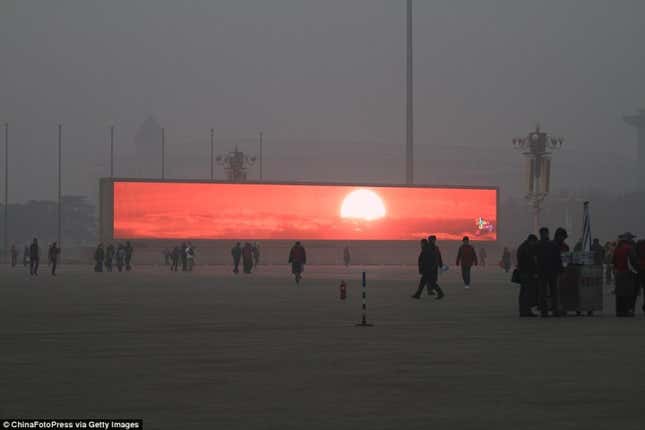
When it comes to China stories, people will believe almost anything. Take, for instance, the reports about pollution being so severe in Beijing that residents now watch radiant sunrises broadcast on a huge screen in Tiananmen Square.
So, that never happened. As Tech in Asia flags, the sunrise is a clip from a tourism ad for Shandong province, in China’s northeast; it’s on screen for maybe 10 seconds or so per loop.
But that didn’t prevent a slew of prominent media outlets—including Time, CBS News and the Huffington Post—from running the story, which originated in the UK-based Daily Mail, each taking their own liberties with the truth. The “glorious sunrise was broadcast as part of a patriotic video loop,” explained Time.
How do stories like this happen? One reason is shabby journalism, something for which the Daily Mail is renowned. As TIA points out, the originator, a writer named James Nye, is based in New York (as is this writer, for the record). Nye surveys a wide range of click-bait topics that fall between morbid and Kardashian. The discovery of that post-apocalyptic photo may have had something to do with the photo search for an article Nye had written earlier that day about severe turbulence in a flight bound for Beijing. The leap to making up news based on a photo isn’t hard, particularly when you crib a quote from an unrelated Associated Press story to round it out.
But more to the point: Western readers eat this stuff up. Based on Quartz’s experiences, Western audiences generally love Chinese “airpocalypse” stories. It’s not only on Quartz that they tend to attract readers; a friend and editor of a China-focused news site told me last summer that he’s equally baffled by the enduring popularity of air pollution stories. And by interweaving the themes of pollution and the government’s Orwellian-tinged attempts to control daily life, the Daily Mail offers a double-whammy of Western reader stereotypes about China.
But how do relatively respectable outfits like Time, HuffPo and CBS jump onboard with circulating fake stories? Simply by not checking, for one. You can be pretty sure if that really happened, there would be some report in Chinese about it (and while there are blog posts and Chinese translations of the Daily Mail story, there aren’t any original reports from Beijing).
What’s more unnerving, though, is that while several of the media outlets updated their posts already, none has changed the headline or noted that the story isn’t true. Does that mean that accuracy and accountability don’t matter for click-bait pieces about China that “feel” true? Unfortunately for readers, that seems to be the case.